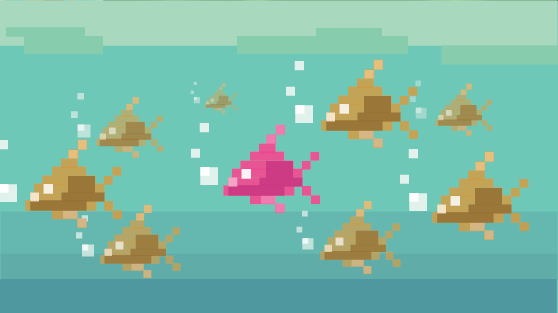Take advantage of the digital product’s new organic life cycle
We’re no longer in the “one and done” age of the traditional retail product, where a game’s sales life cycle is a linear decline toward the bottom. In the digital arena, successful products always have a chance of pulling out of a dead period with a spike in sales, provided a good promotional game plan is put into place. Allen explains the old retail philosophy: “For a big organization that has a [traditional] slate and a portfolio based approach to business – it’s a fire and forget kind of mentality at retail. Right? ‘I launched the product, I get my money, and six weeks later I’m maybe doing some … you know … retail markdown, some inventory clearance. I’m trying to clear the channel and get ready for the next set. I’m moving on and moving on and moving on. …”
Allison also remembers how things were in the old retail system, “At retail you can change the price, and it can take five to six weeks to change the sticker, complacency, you have no idea if they actually changed all of them. All of that stuff is a big problem.”
And how things have improved, “With digital, like I want to run a sale … or Steam is having a Halloween sale. They want 66 percent off for four days. You say, ‘OK.” At 10 o’clock in the morning it happens. Four days later it goes back. You have such granularity in all the changes you can make today it’s amazing. You can stoke and extend the life of your product,” Allison said. “The retail curve looks like this [hand high in the air] for five weeks and then it just flat lines [brings arm down]. [Your product] maybe has a price jump where there is a little blip, but in general in digital it really looks more like a heartbeat. So, you know, as you move through the life cycle you’re going to have to take bigger and bigger chunks out, but you can still have a million dollar week when you’re 19 months old.”
Just like creating buzz during development, marketing and launch phases — it pays to recognize when doing something unorthodox may help pop audience interest in your titles postlaunch. “As the content creator, content owner, game developer, you always want to give people a reason to discover you and it is kind of in your best interest to do wild and crazy things from time to time,” Graham said. “That heartbeat is usually caused by [something] like, you know, Steam approaches you, you probably want to say ‘yes’ to whatever sales they are going to do. We’d like to think Humble Bundle, and we have some data that supports this, but Humble Bundle is very useful in the bag of tricks for developers as a way to gain a lot of attention and driving nice chunks of revenue when it is the right phase for them and their development cycle.”
These promotions and strategies don’t just have to affect one product in your line up. Again, smart planning and execution of a promotion dealing with one product can help revive and spike the sales of other similar products you provide. Allison shares an example of this working firsthand. “So, we launch the series, we go through the five episodes and we have people passionate about it for the first six months, and then we get to the finale. Then we, at some point, [about] two-three months after that finale, we would make the first episode free.
“After we made the first episode free on The Walking Dead, we had a revenue jump of about 400 percent, and it leveled off at about … and maintained a cliff of about 150 percent more than where we were headed. It kind of leveled off after the finale ended in about three months. So for us it is life cycle management. We are probably always going to move to a free episode 1 and then what we have in the app store is that episode 1 is a part of a shell, with four other episodes that you can buy within it. It works. We’ve had since the episode one [of The Walking Dead] went free; we’ve had like 18 million downloads of that episode. So it worked, for us.”
VentureBeat's mission is to be a digital town square for technical decision-makers to gain knowledge about transformative enterprise technology and transact. Learn More


